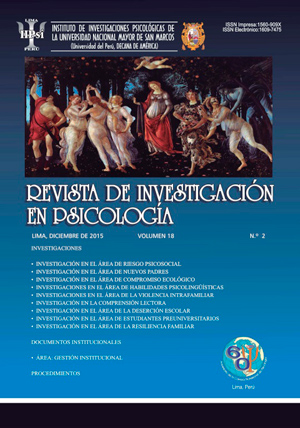New fathers: construction of the paternal role in men that participate actively in raising their children
DOI:
https://doi.org/10.15381/rinvp.v18i2.12082Keywords:
parenting, paternal role, co-responsibility, children raising, masculinityAbstract
The present paper focuses on changes experienced in contemporary society, linked to an increasing conveyance of paternal role in raising children, leading to the birth of a “new father”, characterized by his active and increased participation in raising children. This dynamic has allowed the birth of relations that make paternal role and socially assumed norms more flexible and turn father into a figure that is able to create, maintain and strengthen emotional bonds with his children. The social significance of this study lies in the observation of relationships between father/child, child/father that depart from the mandates of a hegemonic masculinity; thus, redefining the construction of the paternal role based on paradigms which formerly prevented the active participation of men in raising their children. The study was constructed from a phenomenological paradigm with a sampling of 6 men from the Bío Bío Region in Chile, the results prove that fathers deeply desire to fully asume their role as parents, and clearly establish that both political and cultural factors restrict their participation, despite their efforts to be a full and active part of their children’s lives.Downloads
Published
Issue
Section
License
Copyright (c) 2015 Lorena Izquierdo E., Nelson Zicavo M.

This work is licensed under a Creative Commons Attribution-NonCommercial-ShareAlike 4.0 International License.
THE AUTHORS RETAIN THEIR RIGHTS:
a. The authors retain their trademark and patent rights, and also on any process or procedure described in the article.
b. The authors retain the right to share, copy, distribute, execute and publicly communicate the article published in the Journal of Research in Psychology (for example, place it in an institutional repository or publish it in a book), with acknowledgment of its initial publication in the Journal of Research in Psychology.
c. Authors retain the right to make a subsequent publication of their work, to use the article or any part of it (for example: a compilation of their work, lecture notes, thesis, or for a book), provided that they indicate the source. of publication (authors of the work, magazine, volume, number and date).






